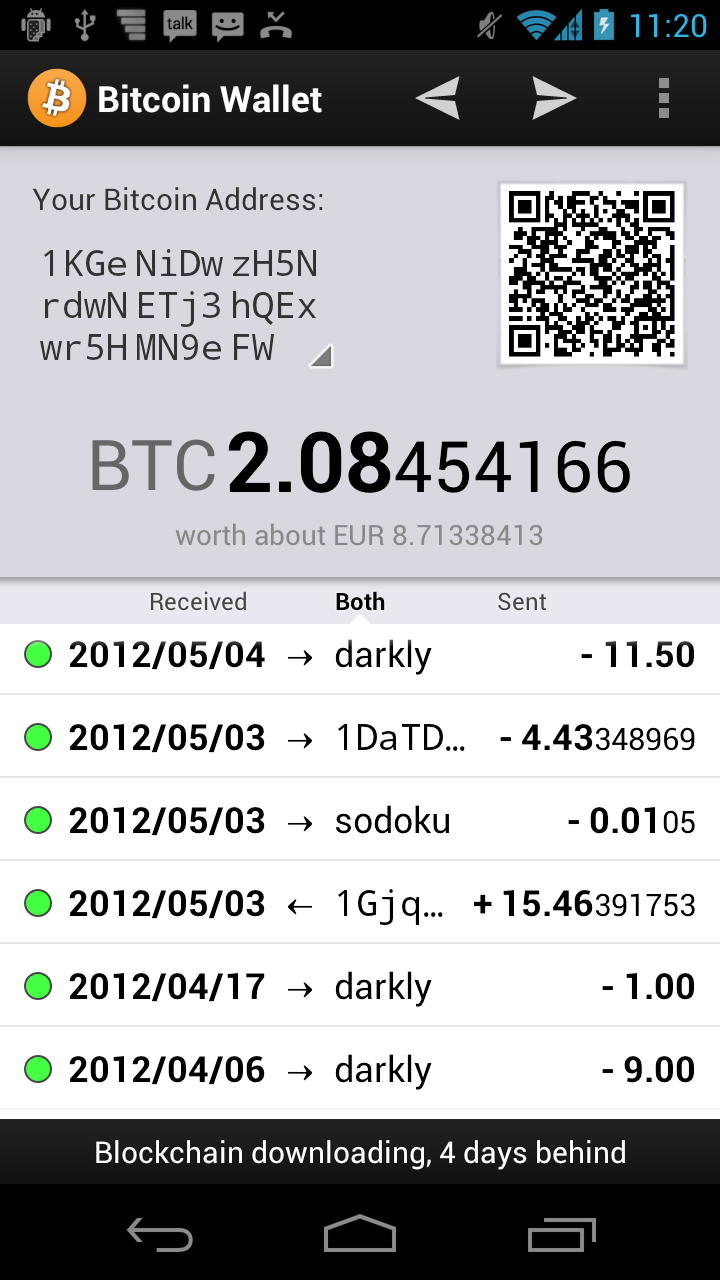Wallet
A Bitcoin wallet is a collection of private keys but may also refer to client software used to manage those keys and to make transactions on the Bitcoin network.
This page covers various wallet formats in use.
Bitcoin Core
The original Bitcoin client stores private key information in a file named wallet.dat following the so called "bitkeys" format.
The wallet.dat file contains your private keys, public keys, scripts (which correspond to addresses), key metadata (e.g. labels), and the transactions related to your wallet. If you have an HD wallet, it also includes the HD seed and the derivation paths for each private key.
It contains:
- keypairs for each of your addresses
- transactions done from/to your addresses
- user preferences
- default key (obsolete, no longer used by Bitcoin Core except by parsing them to detect key/value and wallet corruption)
- reserve keys
- accounts
- a version number
- Key pool
- Since 0.3.21: information about the current best chain, to be able to rescan automatically when restoring from a backup.
The wallet.dat file is located in the Bitcoin data directory and may be encrypted with a password.
It is intended that a wallet file be used on only one installation of Bitcoin at a time. Attempting to clone a wallet file for use on multiple computers will result in "weird behavior"[1].
The format of this file is Berkeley DB. Tools that can manipulate wallet files include pywallet.
Armory
The Armory client uses a custom Deterministic wallet format described here and runs on top of Bitcoin Core.
Bitcoin Wallet
 Bitcoin Wallet uses the bitcoinj protobuf format for its wallet file. However, due to Android isolation of applications, it is impossible to access the wallet file as a non-root user.
Bitcoin Wallet uses the bitcoinj protobuf format for its wallet file. However, due to Android isolation of applications, it is impossible to access the wallet file as a non-root user.
Blockchain.info
Blockchain.info offers a hybrid eWallet called "My Wallet". It use a plain text JSON wallet format. Private keys Keys are stored in base58.
Denarium.com
Denarium is Physical Bitcoin coin manufacturer. Denarium produces easy, handy and secure wallets in a coin form. The private key is stored under a security seal without password protection. Denarium also offers a trustless multisignature coins, which eliminates the need to trust the manufacturer.
Ledger Wallet
Ledger Wallet manufactures various hardware wallets.
Keystone Wallet
Keystone Wallet is a completely air-gapped hardware wallet that uses verifiable QR codes to transmit transaction information back and forth with a mobile app.
Blockchain App Factory
Blockchain App Factory offers Whitelabel cryptocurrency wallet with the latest features, unrivaled security, and user-friendly design to safeguard your cryptocurrencies and monitor them 24/7.
Multibit
Multibit HD (the current version) uses a BIP 0032 (type 2) Deterministic wallet with the format described here. The "Classic" version used the bitcoinj protobuf wallet file.
Blocktrail
Blocktrail offers a BIP 0032 (type 2) Deterministic wallet and for added security also implements Multisignature wallet technology.
TREZOR
TREZOR is an isolated hardware environment for offline transaction signing and using a small display you can visually verify the transaction contents.
Opendime
Opendime is a small USB stick that allows you to spend Bitcoin like a dollar bill. Pass it along multiple times. Connect to any USB to check balance. Unseal anytime to spend online. Trust no one.
Wasabi Wallet
Wasabi Wallet is an open-source, non-custodial, privacy-focused Bitcoin wallet for Desktop, that implements trustless CoinJoin. The CoinJoin coordinator (run by zkSNACKs Ltd., the company that is sponsoring the development of Wasabi) cannot steal from, nor breach the privacy of the participants.
The package includes built-in Tor and, by default, all traffic between the clients and the server goes through it, so IP addresses are hidden and privacy of the users is respected. Under normal conditions, Wasabi Wallet never leaves Tor onion network and it never uses Tor exit relays, significantly decreasing the network attack surface.
Wasabi also includes all standard privacy tech like a Hierarchical Deterministic wallet and address reuse avoidance, as well as mandatory coin control and labeling. The wallet uses BIP-158 Client-side block filtering to obtain its own transaction history in a private way and it has a one-click partial full node integration as it ships with Bitcoin Knots. If the user already has a Bitcoin full node on a local or remote device, then it is possible to specify the IP address and port, or the Tor onion service, and Wasabi will use it to verify and enforce rules of Bitcoin.
In addition to this, it has advanced cutting-edges features like:
- Opt-in PayJoin
- Dust attack protections
- Custom change address
- Anti wallet fingerprinting
Uniblow
Uniblow is a universal blockchain desktop wallet, free and open-source, multi OS (Linux, Windows, MacOS). It is simple to use, and covers all functionalities of a Bitcoin wallet, compatible with many others wallets. There are multiples key device options such as encrypted file, PGP security key and SeedWatcher.
Coin Wallet
Coin Wallet is a non-custodial multicurrency wallet for multiple platforms. Wallet is open-source and available as Web Wallet, mobile (iOS & Android), and desktop apps (Windows, Linux & MacOS). Works since 2015.
Ginger Wallet
Ginger Wallet is a non-custodial, privacy-focused Bitcoin wallet developed by the GingerPrivacy project. It is open source, deterministically reproducible, and designed to provide advanced privacy tools by default while remaining accessible to everyday users.
See Also
- Transaction fees
- Securing your wallet
- EWallet
- Deterministic Wallet
- Choose your wallet
- wallet.dat files with balance and lost password